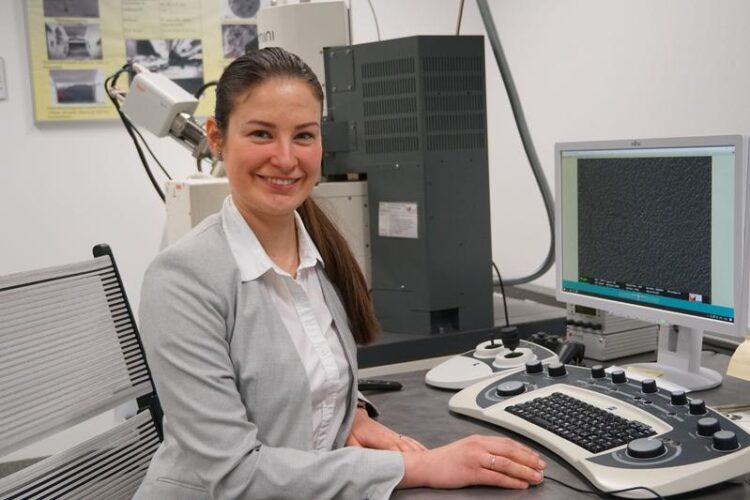EU funding for research on superalloys

Dr. Nataliya Yadzhak, University of Bayreuth.
Photo: UBT
Dr. Nataliya Yadzhak from Lviv/Ukraine, postdoctoral fellow and research associate for the Chair for Metals and Alloys at the University of Bayreuth, has been awarded a fellowship from the EU programme “Marie Skłodowska-Curie Actions for Ukraine (MSCA4Ukraine)” on the proposal of the Alexander von Humboldt Foundation. During the two-year fellowship, she will pursue a research project on hydrogen embrittlement of ferritic superalloys at the University of Bayreuth. Of the 26 research projects in Germany funded by the “MSCA4Ukraine” programme to date, it is one of only two engineering research projects.
“Ferritic superalloys are a new and promising class of high-temperature alloys. They possess excellent mechanical properties at temperatures up to 700 degrees Celsius but have been relatively little researched. I am very excited that the MSCA4Ukraine grant will give me the opportunity to investigate hydrogen embrittlement of iron-aluminum-nickel alloys within this attractive area of fundamental research,” says Dr. Nataliya Yadzhak. In particular, her research will focus on how the mechanical properties of superalloys are affected by hydrogen. Addressing this issue is essential for future industrial applications of components in hydrogen-containing environments.
“Through her previous research activities at renowned universities in France, Ukraine, Great Britain, and ultimately for the Chair for Metals and Alloys at the University of Bayreuth, Dr. Yadzhak has acquired a very high level of expertise, with an extraordinarily high future potential in relation to the current research topic,” says Prof. Dr.-Ing. Uwe Glatzel.
The “Marie Skłodowska-Curie Actions (MSCA)” programme is part of the European Union’s Horizon 2020 framework programme and aims at supporting doctoral and postdoctoral researchers by enabling them to engage in excellent and innovative research activities. In 2022, the special programme “MSCA4Ukraine” was established, which specifically addresses Ukrainian scientists in European universities, research and non-academic institutions. It is coordinated by a consortium comprising the Alexander von Humboldt Foundation, Maynooth University (Ireland), and the European University Association (ESA).
The evaluation of the submitted funding proposals was carried out by the Alexander von Humboldt Foundation. The main selection criteria were the quality of the proposed projects, the professional experience of the scientists, the research focus of the supervising chair as well as the quality of the training opportunities and the accompanying programmes for young scientists at the host university. Most of the research projects funded under “MSCA4Ukraine” are based at universities in Germany: 20.6 percent in total. Only two of these projects belong to the field of engineering sciences, one of which is the project of Dr. Nataliya Yadzhak.
Dr. Nataliya Yadzhak joined the Chair for Metals and Alloys at the University of Bayreuth in May 2022 as a postdoctoral fellow and research associate. Previously, she received her PhD with honors from the University of Clermont Auvergne (France) and the National Ivan Franko University of Lviv (Ukraine) as part of a bi-national doctoral cotutelle programme. While working on her dissertation on mathematical modelling of crack growth in metallic materials, Dr. Yadzhak completed research stays at Andritz HYDRO GmbH in Ravensburg (Germany) and at Keele University (UK).
Prof. Dr.-Ing. Uwe Glatzel is a long-time member of the “Humboldt family” as a Feodor Lynen Fellow at Stanford University, California (1991/92). Prof. Glatzel received his PhD in materials science summa cum laude from the Technical University of Berlin. In 1996, he was appointed as a professor at Friedrich Schiller University in Jena. In 2003, he accepted his current position at the University of Bayreuth.
Wissenschaftliche Ansprechpartner:
Prof. Dr.-Ing. Uwe Glatzel
Chair for Metals and Alloys
University of Bayreuth
Phone: +49 (0)921 / 55-6601
E-mail: uwe glatzel@uni-bayreuth.de
Media Contact
All latest news from the category: Awards Funding
Newest articles

First-of-its-kind study uses remote sensing to monitor plastic debris in rivers and lakes
Remote sensing creates a cost-effective solution to monitoring plastic pollution. A first-of-its-kind study from researchers at the University of Minnesota Twin Cities shows how remote sensing can help monitor and…

Laser-based artificial neuron mimics nerve cell functions at lightning speed
With a processing speed a billion times faster than nature, chip-based laser neuron could help advance AI tasks such as pattern recognition and sequence prediction. Researchers have developed a laser-based…

Optimising the processing of plastic waste
Just one look in the yellow bin reveals a colourful jumble of different types of plastic. However, the purer and more uniform plastic waste is, the easier it is to…



